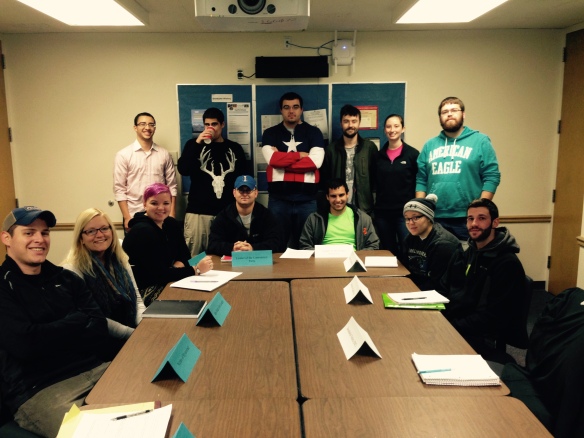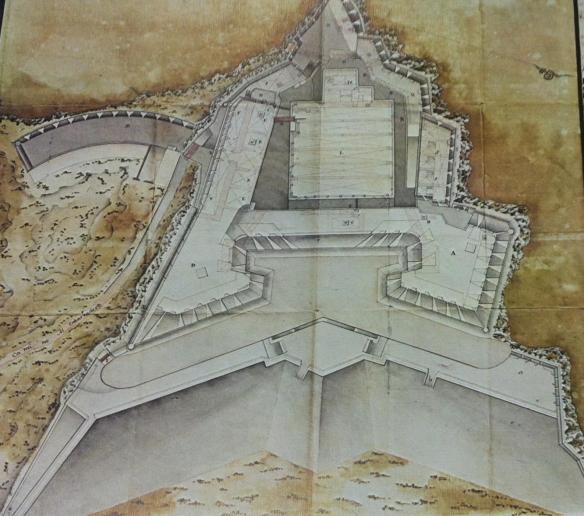Mark Stanford, current Eastern Illinois University Masters in History student, presented a talk in Mattoon’s contribution to the Great War based on news reports from 1917 and 1918, on 9 November (photo from Times-Courier, 10 Nov.). The talk was in conjunction with the opening of The Coles County Historical Society exhibit “The Great War Comes to Coles County,” at the Mattoon Railroad Depot. Aaron Walk, a graduate of Eastern’s Masters in History program, is the Historical Society’s Operations Manager.
Monthly Archives: November 2014
Telstar On the Road
Dr. Newton Key reflected on music from the 1960s in a joint session with Music Dept. professor, Jemmie Robertson as part of Booth Library’s series “Revolutionary Decade: Reflections on the 1960s,” once at Booth Library on 12 November, and again the next evening at Mattoon Depot, 13 November. Dr. Key’s contribution, “Telstar 60s: Global Influences in American Pop,” noted that the early 60s internationalism of chart hits like “Dominique,” “Sukiyaki,” and the first ska-hit “My Boy Lollipop,” disappeared from the charts for a few years during the mid-60s as Beatles-inspired British Invasion made rock-based pop the order of the day. Such internationalism reappeared by the end of the decade, as his own memory of the appearance of the reggae hit “The Israelites” on Montgomery, Alabama radio attests. Future historians of Rihanna or Meghan Trainor, your training starts now.
Students Begin Reenactment of the Transfer of Power in India
On Wednesday, November 12 students in Professor Brian Mann’s The British Empire and the Islamic World class began a historical reenactment of the transfer of power in India by convening a historically based conference between the British and various political leaders in British India. The role-play simulation begins in India in June 1945 at the British summer capital of Simla and continues through to the actual transfer of power in August 1947. With some modifications, the game is based on Barnard College’s Defining a Nation: India on the Eve of Independence, 1945, one of the historical simulations offered through Barnard’s Reacting to the Past (RTTP) series.
Each student in the class is portraying a prominent figure in the story of India’s independence from British rule, and, like their real-life historical counterparts, each student has his or her own objectives to fulfill. By the end of the conference, the students must decide what India will become post-British rule. Will they agree to partition India into two states, as did their historical counterparts? Will they decide on partitioning India into three or more states? Or will the students (while staying true to their roles) be able to depart from history and find a way to keep India whole and united?

Standing from left to right: Muhammad Ali Jinnah – Muslim League (Isaac Mier), Sayyid Maududi – Muslim League (Adam Mohebbi), The Governor-General of India (Alex Gillespie), Maulana Azad – INC (Mike Ludwinski), Brahman faction leader – INC (Emily McInerney), Jawaharlal Nehru – INC (Logan Braddock).
Seated clockwise from left: The Nizam of Hyderabad (Ben Jordan), Tara Singh (Jessica Schluter), Dr. B.R. Ambedkar (Taylor Yangas), Leader of the Communist Party of India (Stephen Szigethy), Leader of the Hindu Mahasaba (Caleb Gurujal), Adherent of “Traditional India” Gandhi (Courtney Sage), Adherent of “Satyagraha” Gandhi (Jake Meyerhoff).
During the first few sessions of the simulation, students will address the British Governor-General and their fellow conference attendees, seeking to persuade their countrymen and the British to sign off on their vision of a future India. Following these introductory speeches the Governor-General will issue an initial proposal for the transfer of power. Over the ensuing weeks, the delegates will debate and vote upon various issues:
Will India be partitioned, and if so, how? Will the post-British government(s) be centralized or decentralized? Will there be guaranteed representation and/or separate electorates for minorities, or will there be majority rule? What will the military situation be like? Will there be a national language or languages? Will the government(s) be secular or religious? Will the economy (or economies) be modern and industrial or premodern and traditional?

Leader of the Sikhs, Tara Singh (Jessica Schluter), calls for the creation of an independent Sikhistan.
Unfortunately for the students, just like in real life, speeches and civil debate may not solve the many disputes that will arise. Each delegate at the conference possesses an extreme special ability which they can invoke during the conference. Depending on the situation, a delegate may invoke this power solely as a coercive threat or may actually use it. For example, the adherents of Mohandas Gandhi might inspire him to go on a hunger strike (and even die) for a specific cause, while the Muslim League could call on India’s Muslims to engage in a “Day of Rage” that could lead to communal violence from which India may never recover.

Osman Ali Khan, the Nizam of Hyderabad (Ben Jordan), makes it clear that he should remain in power whether India is partitioned or not.
By utilizing what they have learned throughout the semester, and by employing the analytical, written, rhetorical, and oral communication skills they have honed as history majors, the students will spend the next few weeks attempting to persuade the British to leave India on their terms.

Delegates prepare for the question and answer session that will begin upon the conclusion of the Nizam’s opening remarks.
We are all excited to see how our conference will play out: Can the students stay true to their historical characters and avoid partition (and the hundreds of thousands of deaths that resulted from it)? Or is (was) partition and widespread communal violence inevitable? Stay tuned…

The leader of the Hindu Mahasaba (Caleb Gurujal) calls for a united India based on Hindu religious and cultural norms. Note the empty chair – Sayyid Maududi of the Muslim League has left the room in protest!
The students and their roles (in order of opening remarks at the conference) are:
- Alex Gillespie as the Governor-General of India
- Jessica Schluter as Tara Singh, leader of the Sikhs
- Ben Jordan as Osman Ali Khan, the Nizam of Hyderabad
- Caleb Gurujal as the leader of the Hindu Mahasaba
- Jake Meyerhoff as an adherent of Gandhi and his views on non-violence
- Courtney Sage as an adherent of Gandhi and his views on traditional India
- Taylor Yangas as Dr. B.R. Ambedkar, leader of the Untouchables
- Stephen Szigethy as the leader of the Communist Party of India
- Isaac Mier as Muhammad Ali Jinnah, President of the All-India Muslim League
- Adam Mohebbi as Sayyid Maududi, Islamist leader of the All-India Muslim League
- Mike Ludwinski as Maulana Azad, President of the Indian National Congress
- Emily McInerney as the Brahman leader of the Indian National Congress
- Logan Braddock as Jawaharlal Nehru, leader of the Indian National Congress
- with Prof. Brian Mann as Prime Ministers Winston Churchill and Clement Attlee
Piracy Undergraduate Research at Newberry Library
Undergraduate historical research at Eastern is supported in a host of ways, including Study Abroad Grants, a plethora of writing awards, and Undergraduate Research and Creative, Scholarship, and Creative Activities Grants (“URSCA”). An example of such research is John Bays who recently used an URSCA grant to travel to Chicago with Dr. Key to conduct research for his Honors Thesis “State Centralization & the 17th Century Court: the Role of Royal Bastards in France & England.” (Yes, even bastards can be subjects of academic scholarship).
A key component supporting undergraduate research has been EIU’s membership in the Newberry Library’s Renaissance Center Consortium. A benefit of this membership is travel grants for EIU students to support research at the Newberry Library. In past years such grants have supported research on Honors Theses concerning Illinois during the American Revolution as well as several research trips by students in Dr. Foy’s Golden Age of Piracy course. On November 7th Dr. Foy and nine students from his piracy course – Laura Adrian, Will Beltran, Clyde Bradford, Michael Glowacki, Alex Hopkins, Bethany Haywood, Lauren Knipp, Emily McInery, and Kathleen Rebbe – woke up before the roosters to catch the 5:27 am City of New Orleans train to the Windy City. A quick cab ride to the library and after an orientation by Will Hansen, the library’s Curator of Americana, the students eagerly dived into reading 17th and 18th century books and manuscripts regarding pirates in the western Atlantic.
Among the students’ finds were Spanish maps showing fortifications used to repel pirates and British naval forces.

Plano de Castillo de los Tres Reyes del Morro, por Mariano de la Rocque, 1777, Newberry Library, Mapas antiguos de Cuba, Map7C G4921.1 1980 M3 (NLO).
After dinner at Eataly in downtown Chicago the group walked over to Union Station for the trip home. Unfortunately, Amtrak did not cooperate as the train returning left three hours (!!!) late, causing the group not to arrive at Mattoon until 3:30 AM. Despite bleary eyes, all had a productive and fun time.
“Remember, Remember the fifth of November…”
…The Gunpowder treason and plot.” A few USA students know the couplet regarding 5 November. A few more know the date from V for Vendetta. But the history of the plot uncovered on 5 November 1605, and subsequent treason day celebrations in England remain worthy objects of consideration. Eastern Illinois University history professor Newton Key discusses the Plot, the day, and possible relevance for the contemporary world on Wayne Brittenden’s Counterpoint on Radio New Zealand, 9 November 2014. If you are not in New Zealand, a podcast is available. Dr. Key has previously discussed aspects of the plot and its memory with a Daily Eastern News Online news editor in 2006, and on the CNN “belief blog” in 2011.






